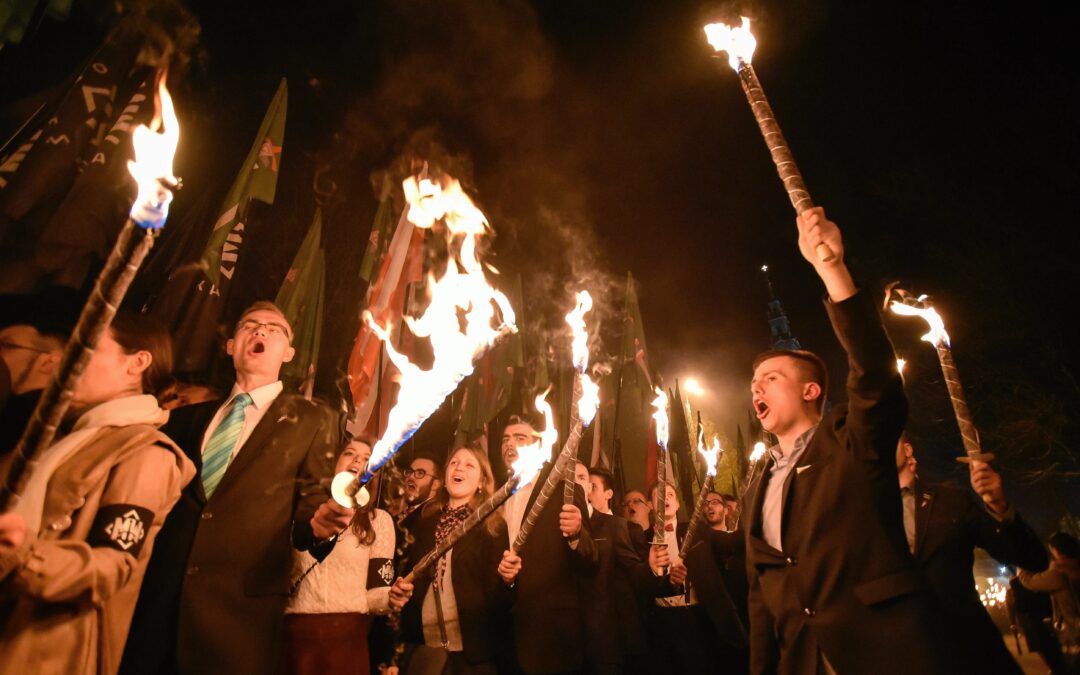Jasna Góra monastery in Częstochowa, home to Poland’s holiest Catholic shrine, has for the first time issued rules prohibiting political speeches, as well as the promotion of racism, xenophobia and nationalism.
The decision follows controversy over an address made last week by a deputy prime minister, Jadwiga Emilewicz, in the chapel containing the Black Madonna of Częstochowa, a venerated icon. The new rules may also restrict the regular pilgrimages of nationalist groups to the shrine.
“Events organised in the sanctuary must not be an opportunity to manifest any political views whatsoever, or any social views that contradict the teaching of the church”, read the new regulations, reported by Catholic magazine Więź.
The document, signed by the recently appointed prior of the monastery, Father Samuel Pacholski, notes that these rules apply not only to visiting lay people, but also to clergy, who should not express “private views, especially political” ones.
Organisers of pilgrimages and other events will only be allowed to invite public officials after receiving the consent of the sanctuary’s authorities, who will also need to approve the programme of such visits.
Opublikowany został REGULAMIN dla organizatorów pielgrzymek i innych wydarzeń na #JasnaGóra. #Paulini przypominają, że #sanktuarium to miejsce otwarte na ludzi wszelkich wyznań, na różnorodność z poszanowaniem wiary i nauczania Kościoła https://t.co/Gj7VsSAS1M pic.twitter.com/KC2yvaBxyd
— JasnaGoraNews (@JasnaGoraNews) June 28, 2020
Last week, just a few days before Sunday’s presidential election, Emilewicz, who also serves as development minister, spoke in front of the Black Madonna at a pilgrimage of business owners.
During her speech, she mentioned how “we are trying to…offer public aid to ensure that [businesses] survive” the current crisis. Though Emilewicz denied that her words were political, they drew criticism from not only her opponents but also some voices in the church.
Jasna Góra monastery has also become the location for events with an even more explicitly political – and especially nationalist – character.
An annual pilgrimage of nationalist groups, for example, has been accompanied by torch-lit marches with flags and banners bearing far-right symbols, as well as chants about beating “leftists” and showing “no mercy to enemies of Polishness”, reports Polsat News.
Around 1500 supporters of far right groups gathered at Jasna Góra Monastery in Częstochowa, Poland's holiest site,…
Opublikowany przez Notes from Poland Niedziela, 31 marca 2019
A separate annual pilgrimage of football supporters – many of whom have far-right sympathies – has featured white supremacist banners and participants chanting “death to enemies of the fatherland”.
Więź also notes that regular pilgrimages organised by Radio Maryja – an ultraconservative Catholic station whose founder, Father Tadeusz Rydzyk, has been an ally of the ruling Law and Justice (PiS) party – have featured “explicit political and xenophobic slogans”.
Annual football fans pilgrimage to Jasna Góra, Poland's holiest site, featured usual nationalist & white supremacist slogans. One celebrated terrorist Janusz Waluś, serving life in SA for murdering black anti-apartheid leader to spark race war. More here: https://t.co/thFXtCbqRb pic.twitter.com/0Mg8InxrHA
— Notes from Poland 🇵🇱 (@notesfrompoland) January 14, 2018
The new regulations appear to preclude such events, stating that “it is strictly forbidden to promote non-Christian attitudes and ideologies in Jasna Góra, in particular ethnic divisions, hostility, contempt, racism, xenophobia, nationalisms and fundamentalisms.”
The monastery must remain “open to people of all faiths, to a diversity of social groups”, reads the document, and the primary aim of all coming to Jasna Góra should be participation in the liturgy, adoration of the Virgin Mary, openness to the word of God and the will to convert.
Main image credit: Lukasz Kolewinski / Agencja Gazeta

Agnieszka Wądołowska is deputy editor-in-chief of Notes from Poland. She is a member of the European Press Prize’s preparatory committee. She was 2022 Fellow at the Entrepreneurial Journalism Creators Program at City University of New York. In 2024, she graduated from the Advanced Leadership Programme for Top Talents at the Center for Leadership. She has previously contributed to Gazeta Wyborcza, Wysokie Obcasy and Duży Format.




















